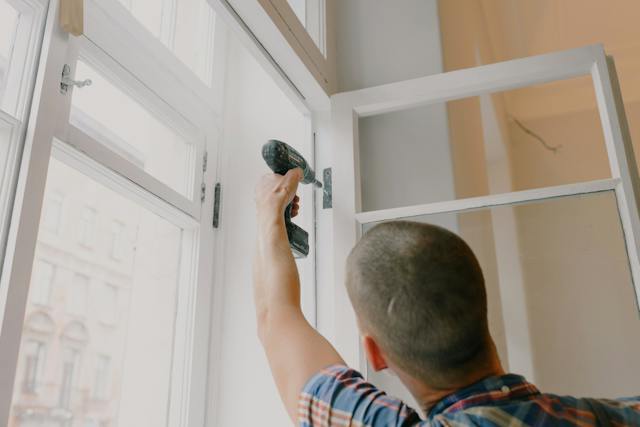Landlord Responsibilities & Rights
- Over 1000 successfully resolved disputes in landlord-tenant relations
- Expertise in landlords’ legal obligations and rights
- Comprehensive guidance on UK tenancy laws and eviction procedures
- Fixed fee structure with payment plans
- Swift case handling and processing
- Proven track record of success
BOOK A FREE CONSULTATION
We do not offer Legal Aid.










We will always get the best possible result for our clients!
We represent you with a proactive & forward-thinking mindset.
Expert guidance for landlord and tenant relationships
Being a private landlord involves a complex interplay of responsibilities and rights. Navigating through these can be challenging, especially when disputes arise. Osbourne Pinner Solicitors offer clarity and expertise in these situations.
Our London-based team has extensive experience and a high success rate representing landlords, providing critical support and advice for effectively managing rental properties and resolving conflicts quickly and effectively.
Free Initial Consultation
Clear, Practical Advice
Transparent Pricing
Efficient Case Handling
Your Rights and Responsibilities As A Landlord
In the UK, landlords of private rental properties have a range of responsibilities, including general upkeep and rights. These vary depending on the type of tenancy agreement in place. Understanding these nuances, especially in terms of general upkeep, is crucial for effective property management.
- Different Tenancy Agreements
The rights and obligations of landlords can differ based on the type of tenancy. The most common is the Assured Shorthold Tenancy (AST), which we will primarily focus on here. However, there are also other tenancy types like non-assured tenancies and regulated tenancies, which were more common before 1997 and offer different levels of landlord and tenant protections. Recognising these variations is vital for landlords to manage their properties lawfully and efficiently.

Landlord Rights
Management & Access
As a landlord, effectively managing your property is crucial. You have the right to access the property for necessary maintenance, repairs or emergencies, ensuring the property remains safe and habitable. This includes conducting regular inspections to comply with health and safety standards.
It’s important to balance this with your tenant’s right to privacy. You must provide at least 24 hours’ written notice before entering the property, except in emergencies. This notice should specify the reason for access and agree upon a reasonable time with your tenant. Your access rights are crucial for upholding property standards, addressing any issues promptly and ensuring tenant safety. However, these rights must be exercised respectfully and in accordance with the tenancy agreement to maintain a positive landlord-tenant relationship.
Financial & Legal Aspects
Landlords hold specific rights concerning financial and legal matters of property rental. Primarily, you have the right to set and receive rent in a timely manner, in accordance with the terms of your tenancy agreement. Adjusting rent must be done legally, following appropriate notice periods and guidelines as stipulated in the agreement and relevant laws.
Additionally, you are entitled to handle security deposits, including setting the amount within legal limits and retaining parts for damages if necessary, following the rules of deposit protection schemes. It’s important to be transparent in financial dealings, such as providing a rent book for weekly payments and adhering to tax obligations. Exercising these rights responsibly is essential for maintaining a lawful and fair landlord-tenant relationship.
Tenancy Agreements & Evictions
As a landlord, you have rights anchored in tenancy agreements and the eviction process. You are entitled to enforce the terms set out in the tenancy agreement, ensuring tenants adhere to their responsibilities.
In cases of contract breaches, particularly unpaid rent or property damage, you have the legal right to initiate eviction proceedings. The eviction process for unpaid rent and other breaches must follow strict legal protocols, including serving appropriate notices (e.g., Section 21 or Section 8 specifically) and obtaining a court order if necessary. It’s crucial to approach eviction lawfully, respecting tenant rights and adhering to proper procedures. Understanding and exercising these rights correctly is key to managing tenancies effectively and mitigating potential disputes.
Landlord Responsibilities
Just as a tenancy comes with rights, it also comes with responsibilities.
Property Maintenance & Repairs

As a landlord, you are responsible for keeping your property in a safe and habitable condition. This includes conducting timely repairs to the building’s structure, plumbing, heating systems and ensuring that all gas and electrical appliances are in safe working order, while maintaining electrical safety standards. Regular maintenance of these appliances is crucial for health and safety standards and addressing any hazards promptly. This responsibility is key to preventing deterioration of the property and ensuring it meets legal living standards, thus providing a secure and comfortable living environment for your tenants.
Legal & Regulatory Compliance

Landlords must comply with various legal and regulatory requirements. This includes conducting right-to-rent checks, providing tenants with valid Energy Performance Certificates, and strictly adhering to gas safety regulations.
Additionally, ensuring that all gas and electrical appliances are safe and certified is a critical part of this compliance. Landlords are also responsible for understanding and acting in accordance with tenancy law, which governs rental agreements and tenant relations.
Staying informed and compliant with these legal aspects is essential for lawful property management and avoiding potential legal repercussions.
Financial Obligations
Landlords have key financial obligations in managing rental properties. One crucial responsibility is participating in a tenancy deposit scheme, protecting tenants’ deposits within a government-approved program. This ensures deposits are securely held and returned appropriately at tenancy’s end.
Additionally, landlords are responsible for accurate tax declarations on rental income and paying any associated taxes. It’s essential to understand and fulfil these financial duties to maintain legal compliance and uphold trust in landlord-tenant relationships. Proper financial management, including adherence to the tenancy deposit scheme, is not only a legal requirement but also a cornerstone of professional property management.
Osbourne Pinner's Services for Landlords
Legal Advice and Support
Navigating landlord and tenant issues can be complex. Osbourne Pinner Solicitors offers expert legal advice to help you understand your rights and responsibilities as a landlord. Whether it's a contractual concern or a specific legal query, our team is equipped to provide you with the clarity and guidance you need.
Mediation and Conflict Resolution
Not every dispute needs to escalate to legal battles. Osbourne Pinner Solicitors specialise in mediation, offering a pathway to amicably resolve conflicts between landlords and tenants. This can help you avoid costly and time-consuming court proceedings.
Representation in Legal Proceedings
Should your case require legal action, Osbourne Pinner provides robust court representation. We handle the intricacies of legal procedures and correspondence, ensuring your case moves forward efficiently, with your best interests at heart.
Free Initial Consultation
Transparent and Clear Advice
No Hidden Fees
Speedy Processing
Schedule Your Complimentary 30-Minute Consultation
Understanding the complexities of landlord-tenant relationships can be challenging. Osbourne Pinner Solicitors are here to offer you insightful advice and guidance on landlord-related issues. Benefit from our free 30-minute initial consultation, available both in-person and via video call, to discuss your concerns and receive expert legal advice. To book your consultation, contact us at 0203 983 5080 or through our online enquiry form.
- Extensive experience in resolving landlord-tenant disputes
- In-depth understanding of landlords’ legal responsibilities and rights
- Expertise in UK eviction laws and procedures
- Transparent fee structure with flexible payment options
- Quick and efficient case handling
- Proven success record in landlord and tenant legal matters
BOOK A FREE CONSULTATION
We do not offer Legal Aid.
FAQs about Landlord Responsibilities & Rights
In 2024, landlords in the UK should be aware of several upcoming changes:
- Renters Reform Bill: This will introduce significant changes in how properties are let to tenants, including the establishment of a PRS Ombudsman and a Decent Homes Standard for the private rented sector.
- Leasehold and Freehold Reform Bill: This bill is particularly relevant for landlords owning leasehold properties, potentially affecting lease extensions and ground rent regulations.
- Changes in Stamp Duty: The last year of lower stamp duty rates is 2024, impacting property purchase costs.
- Pension Lifetime Allowance Abolition: From April 2024, this change will affect landlords who invest in buy-to-let properties using pension funds.
- Capital Gains Tax Allowance Reduction: Starting April 2024, this will affect the taxable amount on property sales.
- New CMA Guidance on Letting: Expected in 2024, this will provide updated information on consumer protection laws in the rented housing sector.
- General Election Impact: The upcoming General Election might bring further changes in policies affecting the private rented sector.
These points summarise the key changes landlords should prepare for in 2024. However, these can change. For detailed information, it’s recommended to refer to relevant legal and property management resources.
The Renters Reform Bill, once law, will introduce significant changes for landlords, including the establishment of a PRS Ombudsman, introduction of the Decent Homes Standard for private rentals, and modifications to the rental property registration process. Landlords will need to adapt to these new regulations to ensure compliance.
In long-term tenancies, landlords maintain their responsibilities for property upkeep, safety checks, and legal compliance. The duration of the tenancy doesn’t typically alter these fundamental obligations, although specific terms may be outlined in the tenancy agreement.
Landlords are legally required to ensure the property is safe and habitable. This includes structural repairs, maintaining heating and plumbing systems, and complying with safety standards for gas, electricity, and fire. Regular maintenance is vital to meet these legal requirements.
Landlords must follow legal guidelines for rent increases, typically requiring advance notice. For repair disputes, landlords are advised to address and resolve issues promptly and in accordance with the tenancy agreement. Clear communication with tenants is key.
The Tenant Fees Act limits the fees landlords can charge tenants, primarily focusing on the tenant’s deposit and rent. Landlords must ensure compliance to avoid legal penalties, with most other charges now prohibited.
Landlords must follow legal procedures for eviction, including serving proper notices (like Section 21 or Section 8) and potentially obtaining a court order. The process varies depending on the tenancy type and reason for eviction.
Landlords have the right to set terms regarding subletting in the tenancy agreement. Typically, tenants need the landlord’s permission to sublet. This permission can be outright denied or granted under specific conditions. If the tenancy agreement explicitly prohibits subletting, tenants must adhere to these terms to avoid breaching their contract.
Landlords have a critical responsibility to ensure fire safety in their rental properties. This obligation includes not only installing smoke alarms on every floor but also providing carbon monoxide alarms in any room containing solid fuel burning appliances, such as wood burning stoves or coal fires. The presence of carbon monoxide alarms is essential for detecting this dangerous gas, which is doorless and colourless, thereby safeguarding tenants from potential poisoning.
Regular maintenance and safety checks of all fire safety equipment, including both smoke and carbon monoxide detectors, are mandatory to ensure they are functioning correctly. In properties with multiple occupancies, landlords must also adhere to additional fire safety regulations. These can include the provision of fire extinguishers and the maintenance of clear and accessible fire escape routes. Strict compliance with these safety measures, particularly the proper installation and upkeep of carbon monoxide alarms, is crucial not only for tenant protection but also for avoiding legal repercussions.
Landlords must ensure their properties have a valid Energy Performance Certificate (EPC), which rates the property’s energy efficiency. In the UK, rental properties are required to have a minimum energy efficiency rating of E.
Failure to meet this standard can prevent landlords from renting the property. Landlords should strive to improve their properties’ energy efficiency, not only to comply with legal requirements but also to enhance the property’s appeal to potential tenants and reduce energy costs in the long term.
Yes, as a landlord, you remain legally responsible for all duties related to your rental property, even if you delegate these tasks to a letting agent. While letting agents can perform a wide range of functions on your behalf – such as property maintenance, rent collection and tenant communication – the ultimate legal responsibility rests with you, the landlord.
This means that if any legal issues arise due to non-compliance or negligence in these duties, you could be held accountable, not the letting agent. It’s crucial to understand that employing a letting agent does not absolve you of your legal obligations. Therefore, it’s important to choose a reliable and competent agent and stay informed about your property’s management to ensure all responsibilities are met in compliance with the law.
In the UK, a landlord’s responsibility for decorating depends on the tenancy agreement and the nature of the decoration. Generally, landlords are not legally obliged to redecorate a property during a tenancy. However, they are responsible for maintaining the property in a good state of repair. If the need for decoration is due to wear and tear or damage that’s the landlord’s responsibility to fix, then they might need to redecorate. Any agreement for decoration should ideally be included in the tenancy agreement. Tenants and landlords can negotiate on decorative changes, but it’s not a standard legal obligation for landlords.
